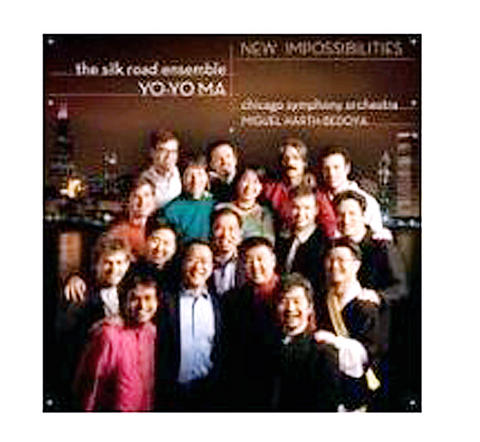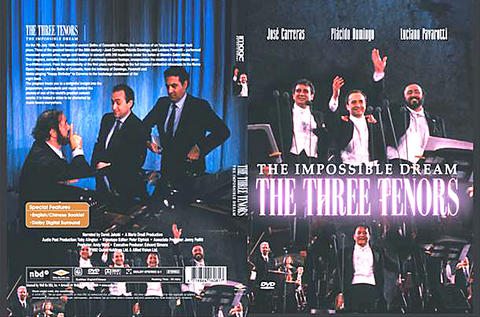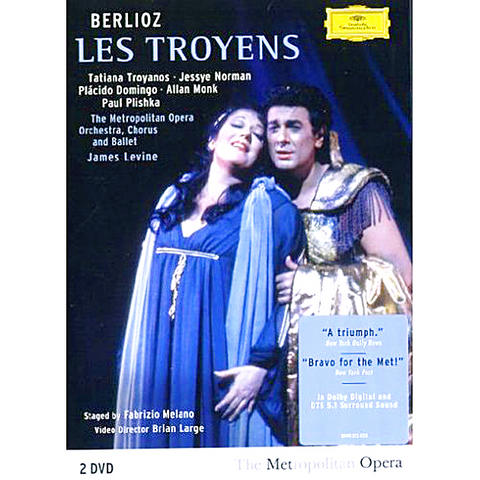Les Troyens (The Trojans) can be relied on to be a headache for anyone who opts to take it on. It represented Hector Berlioz's bid for operatic immortality, but in reality it contains long stretches of considerable boredom. He conceived it on a massive scale, but only the last three of its five acts were performed during his lifetime, and heavily cut at that. New York's Metropolitan Opera decided to mount it to open their centennial season in 1983, but even this was a re-staging of their production 10 years earlier. It's this version that finally arrives in DVD format from Deutsche Grammophon this month.
The opera retells the story told in Books Two and Four of Virgil's Aeneid - the fall of Troy and Aeneas's subsequent love affair with Dido, Queen of Carthage. You begin with dazed Trojans celebrating the departure of the Greeks, and wondering what that bizarre wooden horse they've left behind is all about; and you finish with Dido stabbing herself on her funeral pyre as Aeneas, leaving her loveless and middle-aged, sails away to found Rome.
Jessye Norman sings Cassandra, the young clairvoyant who's the only Trojan to foresee what's about to happen and the dominant character in the first two acts. Tatiana Troyanos takes on Dido, singing at the end what Berlioz called the saddest music he'd ever written. As for the youthful Placido Domingo, he reportedly tried to persuade the Met to find somebody else to sing Aeneas after studying the part and finding it impossibly high. As one wag remarked, they probably didn't try very hard.

The result is a mixed bag at best. The ballet sequences are truly awful, with dancing that was old-fashioned even in the 1980s, though not inappropriate to the unimaginative production style. In addition, the director expects the audience to be satisfied with a mere horse's head to represent the wooden horse (for which the Met's vast stage would have had plenty of room) and the royal hunt, during which Aeneas and Dido first become lovers, is left un-staged and simply a musical interlude.
Even so, there are some fine things. Jessye Norman, in her Met debut, is outstanding. The final 45 minutes, too, are very strong - Domingo trembling at the prospect of the inevitable goodbye scene, and Troyanos utterly convincing as she moves towards her final moments.
But Les Troyens as a work is uneven at best, and Berlioz was no match for Wagner (who some believe he was trying to emulate). If you want great opera, this doesn't really make the grade. Nevertheless, if you genuinely want Berlioz's largest-scale assault on eternal fame featuring internationally-known names, you'll have to consider this version.

It's well-known that Glenn Gould recorded Bach's Goldberg Variations twice, once in 1955 when he was 23, then again in 1981, a year before he died. The first version made his name, while the second provided a yardstick to assess how far this by now strange, reclusive odd-ball had traveled.
A DVD from Sony Classical shows him playing the whole set in the latter year. You begin by seeing him chat with the filmmaker Bruno Monsaingeon, but most of the DVD has him simply playing in close-up - beating the rhythm in the air whenever one hand is unoccupied on the keyboard, singing quietly (or not so quietly) to himself, and the whole time in a kind of trance.
The whole film lasts an hour, and is a good introduction (if that's what you need) to J.S. Bach, Glenn Gould, and maybe, too, what it's like to be a genius who has no alternative but to dedicate his life to the service of an extraordinary talent.

Well Go USA in Taiwan continues to commemorate the passing of Pavarotti by promoting a DVD called The Impossible Dream which shows arrangements of the first Three Tenors concert in 1990. You watch them rehearsing to piano accompaniment, hanging around backstage at the ancient Roman baths at Caracalla where the event was staged, conferring with the conductor Zubin Mehta (who had to manage the forces of two combined orchestras), and generally priming themselves for the occasion. There are better memorials to Pavarotti, but, if you haven't seen this one before, it remains of genuine interest.
Apparent impossibility overcome appears again with Yo-Yo Ma's (馬友友) latest CD New Impossibilities. It's the third CD containing material from his Silk Road Chicago project, a year of concerts and improvised sessions that ended in June. Seventeen musicians from, among other places, Lebanon, Iran, India and China combined with Ma and the Chicago Symphony Orchestra to expand boundaries and unite different musical traditions. So you hear tablas and violins, pipas and cellos, a caxixi and a double bass, all played by masters in their field.
However old Ma gets (he's now 52), he doesn't stop bringing disparate people together through his performances. In Chicago, he won extensive praise for his continuing optimism and energy. For him, the Silk Road is a symbol of continuing inter-connectedness, which is still as valid today as it was 2,000 years and more ago.


June 2 to June 8 Taiwan’s woodcutters believe that if they see even one speck of red in their cooked rice, no matter how small, an accident is going to happen. Peng Chin-tian (彭錦田) swears that this has proven to be true at every stop during his decades-long career in the logging industry. Along with mining, timber harvesting was once considered the most dangerous profession in Taiwan. Not only were mishaps common during all stages of processing, it was difficult to transport the injured to get medical treatment. Many died during the arduous journey. Peng recounts some of his accidents in

“Why does Taiwan identity decline?”a group of researchers lead by University of Nevada political scientist Austin Wang (王宏恩) asked in a recent paper. After all, it is not difficult to explain the rise in Taiwanese identity after the early 1990s. But no model predicted its decline during the 2016-2018 period, they say. After testing various alternative explanations, Wang et al argue that the fall-off in Taiwanese identity during that period is related to voter hedging based on the performance of the Democratic Progressive Party (DPP). Since the DPP is perceived as the guardian of Taiwan identity, when it performs well,

A short walk beneath the dense Amazon canopy, the forest abruptly opens up. Fallen logs are rotting, the trees grow sparser and the temperature rises in places sunlight hits the ground. This is what 24 years of severe drought looks like in the world’s largest rainforest. But this patch of degraded forest, about the size of a soccer field, is a scientific experiment. Launched in 2000 by Brazilian and British scientists, Esecaflor — short for “Forest Drought Study Project” in Portuguese — set out to simulate a future in which the changing climate could deplete the Amazon of rainfall. It is

Artifacts found at archeological sites in France and Spain along the Bay of Biscay shoreline show that humans have been crafting tools from whale bones since more than 20,000 years ago, illustrating anew the resourcefulness of prehistoric people. The tools, primarily hunting implements such as projectile points, were fashioned from the bones of at least five species of large whales, the researchers said. Bones from sperm whales were the most abundant, followed by fin whales, gray whales, right or bowhead whales — two species indistinguishable with the analytical method used in the study — and blue whales. With seafaring capabilities by humans